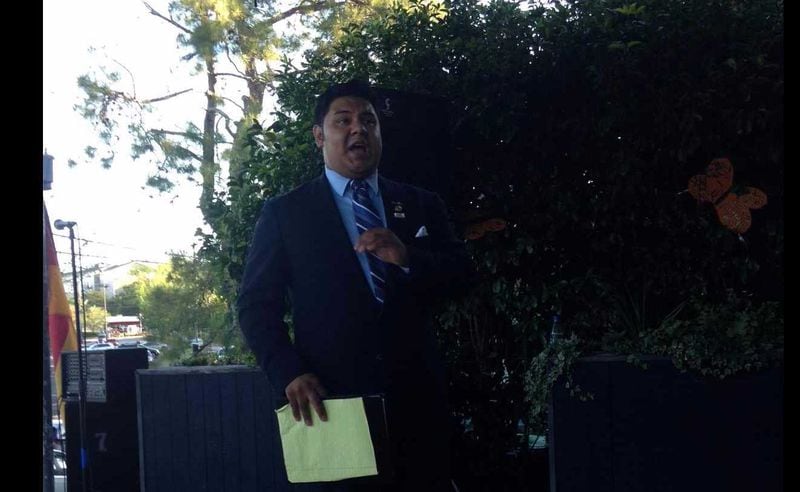Ashley Goodrich is a full-time high school social studies teacher and a doctoral student at the University of Georgia in the College of Education’s Department of Educational Theory and Practice.
In this essay, she says Georgia's policy banning undocumented students from the top research campuses and requiring them to pay out-of-state tuition at other public colleges hurts the students and the state.
By Ashley Goodrich
It's that time of year when the much anticipated college acceptance and dreaded rejection letters are arriving in the mail. For many high-achieving graduating seniors, their letters won't be coming from schools in Georgia because they're undocumented.
What keeps them from enrolling or even applying to Georgia's public universities? Discriminatory policies passed by Georgia's policymakers—actions meant to keep some of our children, educated in Georgia, from being able to afford a postsecondary education in our state. While other states have overturned restrictions on applying for state financial aid and in-state tuition, our legislators have done just the opposite.
But Georgia's undocumented students refuse to halt their dreams. Some choose to leave the state to continue pursuing their education and as a result, Georgia is losing talented people because of discriminatory policies. Others attend school close to home, but take longer than four years to graduate due to exorbitant tuition costs.
Credit: Maureen Downey
Credit: Maureen Downey
Meet 20-year-old Aldo Mendoza. Although Aldo has lived in Athens, Georgia, for most of his life, graduated from one of its public schools, and holds a worker’s permit and driver’s license through Deferred Action for Childhood Arrivals, state policymakers refuse to treat him equally when it comes to attending the state’s public colleges and universities.
Aldo's opportunities to pursue higher education in Georgia were severely limited in 2008 when the Georgia General Assembly passed Senate Bill 492 that denies in-state tuition and Georgia's HOPE Scholarship to undocumented immigrants. Two years later, the University System of Georgia Board of Regents signed off on policy 4.1.6 which bans college-bound students from applying to Georgia's top five public universities, including the University of Georgia. Recently Georgia's Supreme Court denied students with DACA, like Aldo, the opportunity to sue the Board of Regents for in-state tuition..
By growing up in Athens, Aldo has been part of UGA programs that partner with Clarke County K-12 schools, like the Center for Latino Achievement and Success in Education's SALSA program. "All my life I've been involved with UGA," says Aldo.
After the onslaught of these discriminatory decisions, Aldo feels deceived. “I basically grew up around UGA and when the ban happened [as a high school junior], I felt like I was being stabbed in the back because all my life I grew up around it and now I’m unable to attend. Some of my peers, well my best friends, go to UGA.”
Now, Aldo attends the University of North Georgia. He takes two to three courses a semester. He would prefer to take a regular course load, but he can’t afford it, even with his part-time jobs. Because of SB 492, he does not qualify for in-state tuition. Therefore he would have to pay $19,748 (out-of-state tuition) for a full academic year instead of $6,206 (in-state tuition). That’s three times more than his high school classmates are paying.
Instead of giving up, Aldo has become a leader in the undocumented youth movement through Georgia Undocumented Youth Alliance and ULead Athens, an organization that provides college and career guidance to undocumented students. "Before then, I was kind of iffy about going to college because in the back of your mind, you're undocumented. Your parents push you to go to college, but you don't feel like you can."
Many educators, students, parents and community members aren't aware of these policies. And undocumented students, like Aldo, don't realize the impact of these policies until they start applying to schools.
What can we do to support our undocumented students in their pursuit of a postsecondary education?
Schools need to provide college and career guidance specific to the needs of our undocumented student populations in their advisement and counseling programs. One place to start is the national organization Educators for Fair Consideration, which has a clearinghouse of online resources for educators.
Students can be allies in the undocumented student movement. High school students in Athens have done just that, by organizing DREAMfest to educate the community about these policies. UGA students, faculty, staff, and alumni signed a petition asking President Jere Morehead to lift the ban. In February, college students from UGA, Harvard, Smith, Bard, and other colleges worked in solidarity with Freedom University to stage integrated classroom sit-ins on UGA, Georgia Tech, and Georgia State campuses.
Parents, family, and friends of graduating seniors can give support to undocumented students in their pursuit of a postsecondary education by donating to the ULead scholarship fund.
What can we all do? Contact members of the Board of Regents and your representatives urging them to pass legislation that will overturn these anti-immigrant policies.
In response to Georgia's anti-immigrant legislation, a group of University System of Georgia academics criticized policymakers for relegating " a whole group of young people to a permanent caste of lower status, unable to obtain an education and condemned to work for low wages in the shadows of the economy. Their undeveloped talents represent both a practical loss and a moral failure that the state of Georgia can ill afford."
We should all follow the lead of this group of professors and condemn the continued segregation of our public colleges and universities.
About the Author







